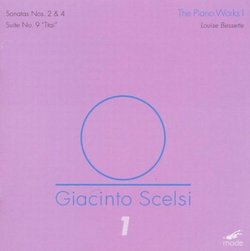| All Artists: Giacinto Scelsi, Louise Bessette Title: Scelsi: The Piano Works 1 Members Wishing: 3 Total Copies: 0 Label: Mode Release Date: 11/28/2000 Genres: Jazz, Classical Styles: Chamber Music, Forms & Genres, Sonatas, Suites, Historical Periods, Classical (c.1770-1830), Modern, 20th, & 21st Century Number of Discs: 1 SwapaCD Credits: 1 UPC: 764593009221 |
Search - Giacinto Scelsi, Louise Bessette :: Scelsi: The Piano Works 1
 | Giacinto Scelsi, Louise Bessette Scelsi: The Piano Works 1 Genres: Jazz, Classical
|
Larger Image |
CD Details |
CD ReviewsIn search of more powerful advocates for Giacinto Scelsi L. Leonard | Kapuskasing, Ontario Canada | 09/13/2001 (2 out of 5 stars) "Notwithstanding all the accolades bestowed upon Louise Bessette for her "exhilarating and elegant pianism" (see other reviews of her work, notably in her performances of the works of Messiaen) for her performances and recordings of music of our time, her current recording of the music of Scelsi falls short of expectation on all fronts. Critical listeners can already enjoy Scelsi's Suite no. 11, Ttai, in better performances by both Marianne Schroeder and Werner Bartschi. I question the need of yet another recording of this work (there are other suites which merit attention and which appear not to have been recorded, notably nos. 2, 5, and 7). Sonata no. 4 is welcome, yet it is here given a performance so amorphous rhythmically that in Bessette's hands it becomes an incoherent mess, save perhaps for the 2nd movement (Lento), which at times approaches lucidity. Scelsi's music relies on rhythmic vitality (absolute precision is a priori impossible, as it is well-known that Scelsi relied on "assistants" in the notating of his scores, and it is likely that minor imprecisions proliferate throughout the works in print) and a commanding and penetrating sense of structure, both of which are simply not evident in the performances on this disc. I remain confident that the music of Scelsi will find more powerful advocacy than this and that adventurous pianists who make a specialty of this repertoire will give us a true diversity of works to explore." Not for everyone, yet an evocative voice here. scarecrow | Chicago, Illinois United States | 12/09/2000 (4 out of 5 stars) "I get letters on why I always give five stars, and my reply is always why should I waste my time and the reader's time on anything less than. But here's music that falls in between, it's music you should experience but it's not for everyone. And it's odd I say that for as a modernist Scelsi's creative agenda was straightforward, fairly obvious and predictable. He has pieces on one single note, the final string quartets develop and promuligate a timbral argument around single tones, an endeavor the Fluxus anarchists in New York in the Sixties thought they were the (first originals) to discover this,like La Monte Young.The (circle) is the visual metaphor for sound Scelsi loved to evoke his entire life, similar to Asian cultural thinking about sound where,like the mantra, your consciousness finds itself within the connection the special spiritual places sounds inhabit(like from Sri Aurobindo by Satprem). Scelsi was much closer to this Asian thinking than say Stockhausen not cluttering his music with mega truckloads of theoretical perspectives as Stockhausen Enterprises.This piano music was written well, the two Sonatas one(the Second) in 1939 the other in 1941, and they are fairly representational, contrasting ideas, repeated note, almost toccata like with gong-like roaring tones as other movements.The Suite is very nice, Scelsi doesn't have a large emotive pallette, he doesn't write character pieces, and textures often repeat,but his music is deeply memorable and evocative, again in its directedness, its focused concentration that makes it special and a primary contribution to the literature of the piano.He is not afraid of reamining in a register for along length of time. Bessette I don't know what's going on, the rhythms seem to be all wrong or else the metronomic indication changes each measure. Most of this music sounded freely improvisational, and we know Scelsi himself improvised this music in its creation, recording it and allowing assistants to put it down on paper. This is quite legitimate, there are countless other stories of such "assistance"."
|

 Track Listings (15) - Disc #1
Track Listings (15) - Disc #1